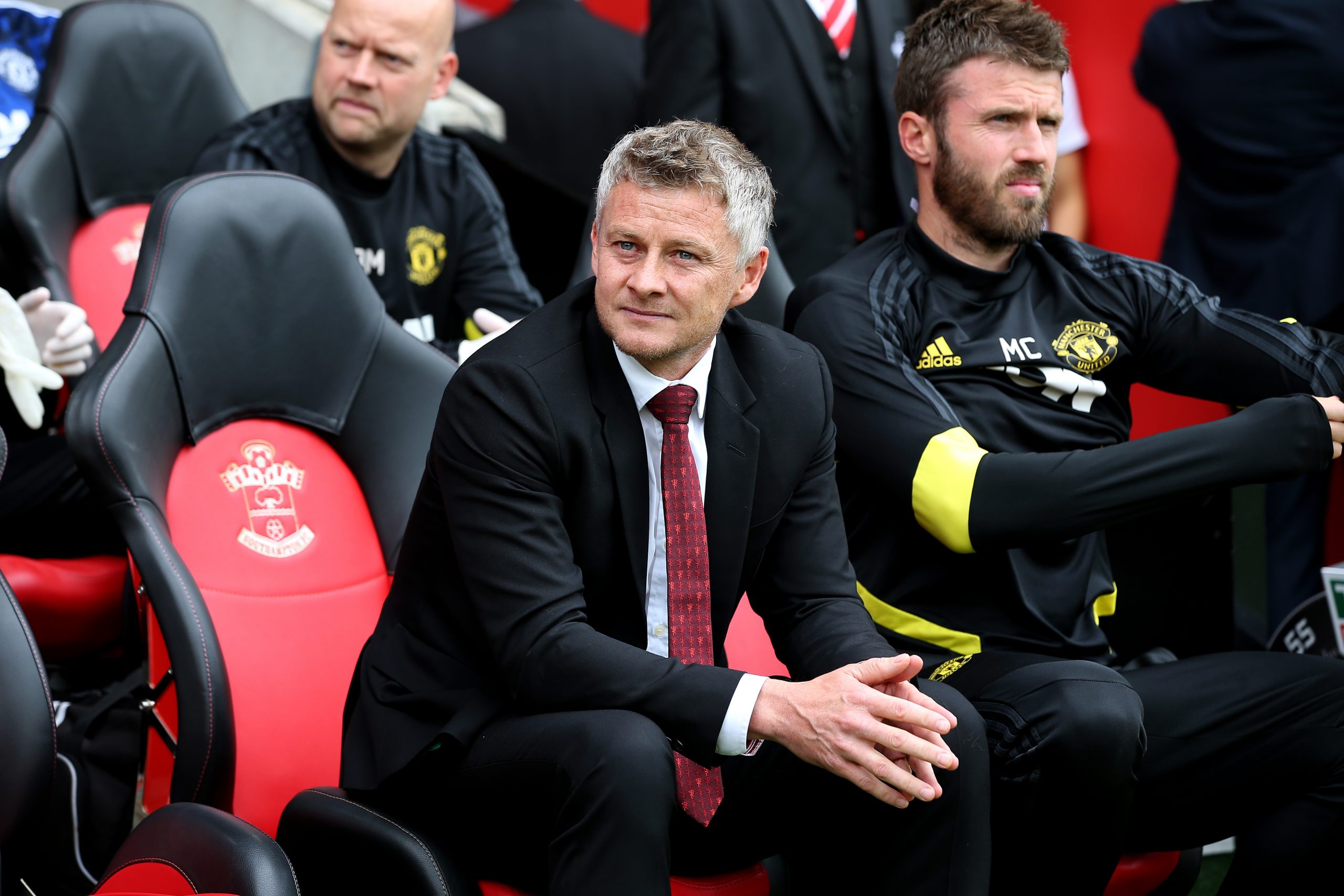As always, it’s complicated. Any traditional results based analysis will tell you that Manchester United have started the Premier League season very poorly. Five points from four games is never a great haul, and it goes down all the worse when it features underwhelming draws at Wolves and Southampton along with the cherry on the cake, a 2-1 defeat at home to Crystal Palace. Memories of a 4-0 win over Chelsea on the first weekend of the season have all but vanished. This side has just stunk, and there’s no putting a positive spin on it. Right? It didn’t go unnoticed that United’s expected goals haven’t looked so bad, at least at first glance. This made some noises among some United-focused Twitter accounts, but really hit the stratosphere when Sam Carney of the official Manchester United website wrote an article on the subject. xG has made its way into a lot of mainstream publications in recent years to the delight of many, but something put out on the official site of one of the biggest clubs in the world might be a new pinnacle. In the article, Carney argues that “In each of our four matches so far, United have significantly outperformed our opponents in terms of xG”, eventually stating that “through a combination of bad luck and superb opposition goalkeeping – think Rui Patricio’s excellent save from Paul Pogba’s penalty in the Wolves game – our dominance hasn’t been reflected in the final scoreline. “But these numbers suggest to me that Ole [Gunnar Solskjaer] has [United] playing a positive brand of attacking football that should start to pay dividends sooner, rather than later”. To start with, yes, the numbers do look pretty solid. Not “we’re gonna win the league” good, but definitely decent, and nothing that would ring any alarm bells if Paul Pogba and Marcus Rashford score a few penalties and David De Gea makes a couple of big saves. 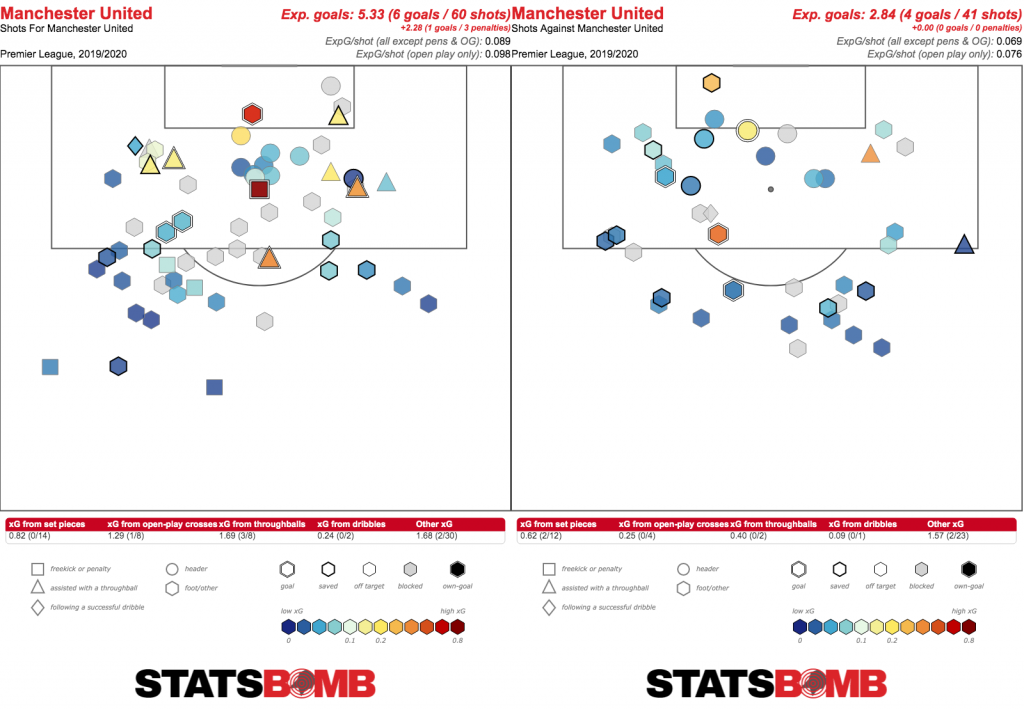 Since we’re only four games into the season, making definitive claims from the numbers is hard. So let’s look a little closer at each of these fixtures and see what actually happened here.
Since we’re only four games into the season, making definitive claims from the numbers is hard. So let’s look a little closer at each of these fixtures and see what actually happened here.
One Game at a Time
Game one was the actual win, a very pleasing 4-0 scoreline against Chelsea. 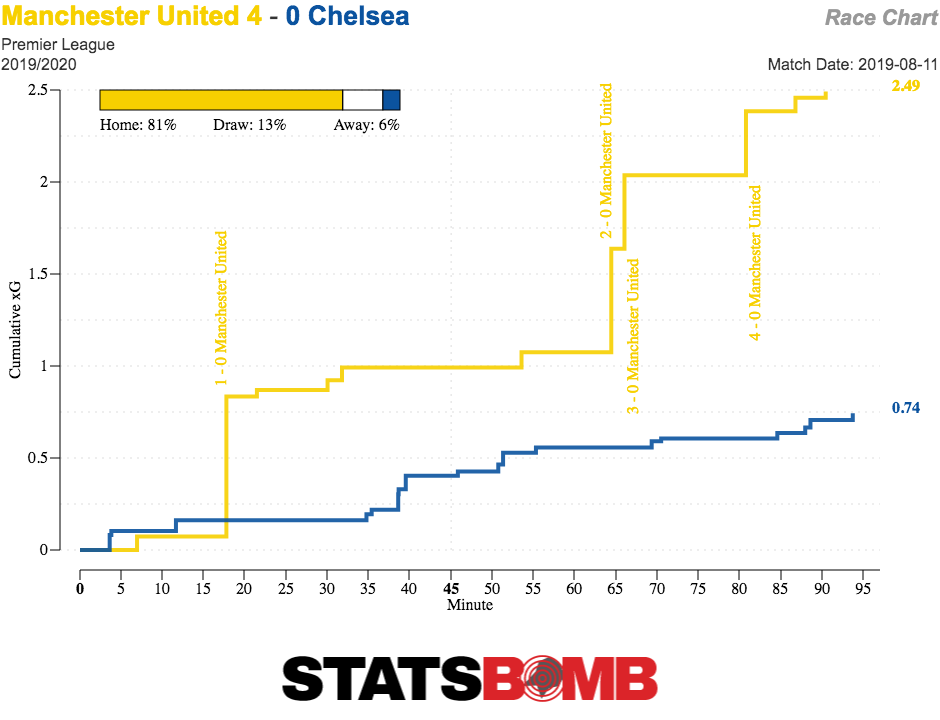 It’s worth mentioning here that United were only a penalty better than Chelsea in the first half. Including penalties in xG models is always questionable, and if predicting future performance is what you’re aiming to do, the prevailing consensus is generally to exclude them. That way, you’re left with four shots in 45 minutes, none of them decent chances.
It’s worth mentioning here that United were only a penalty better than Chelsea in the first half. Including penalties in xG models is always questionable, and if predicting future performance is what you’re aiming to do, the prevailing consensus is generally to exclude them. That way, you’re left with four shots in 45 minutes, none of them decent chances. 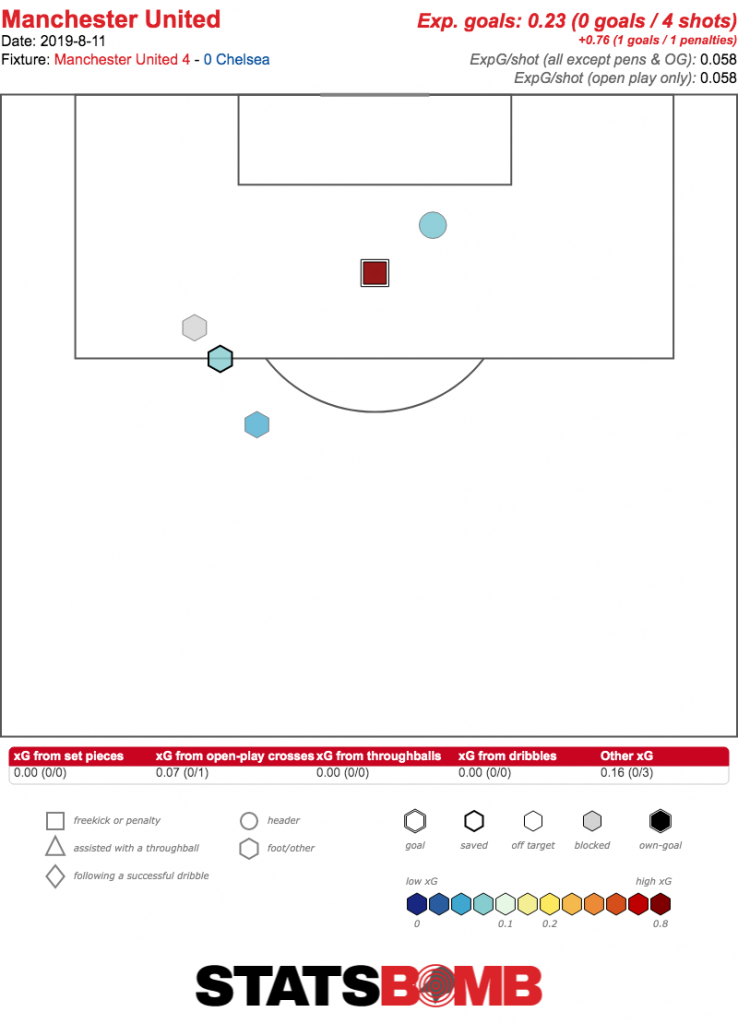 But ahead they were, and it allowed them to play on the break in the second half. With Chelsea’s poor defensive organisation, United created three very good chances on the counter, and scored them all.
But ahead they were, and it allowed them to play on the break in the second half. With Chelsea’s poor defensive organisation, United created three very good chances on the counter, and scored them all. 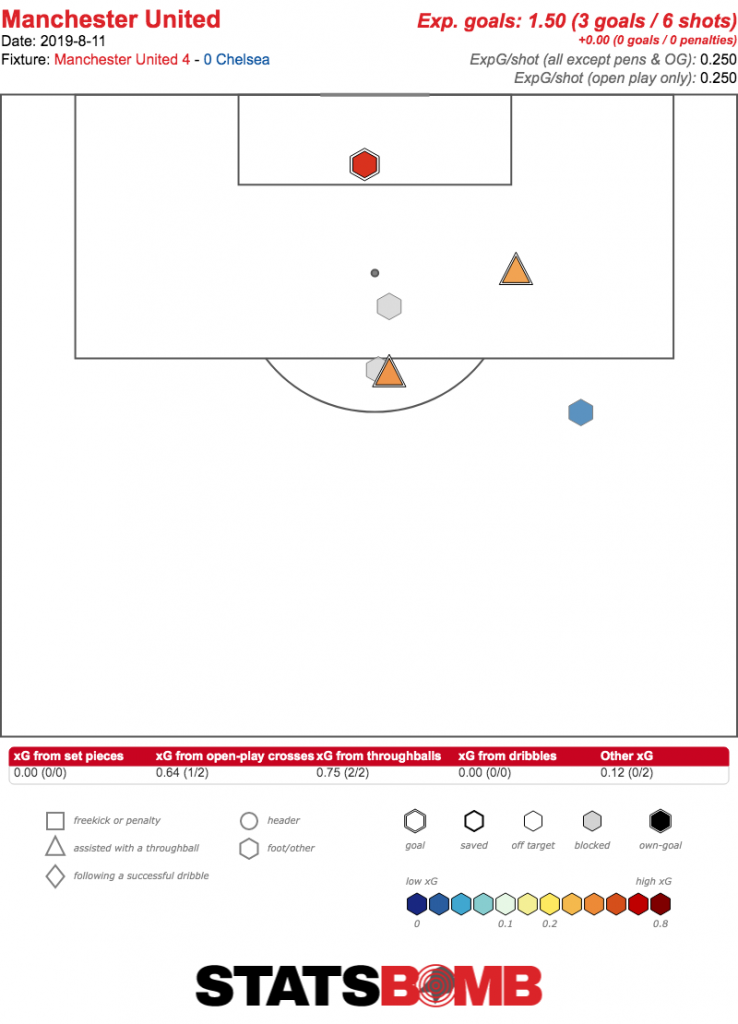 Onto the game at Wolves and where the supposed troubles started. The home side, as they often do, played very conservatively and looked to create on the counter, but it’s a credit to United that they really struggled with this, producing just five shots of which none were more than half-chances.
Onto the game at Wolves and where the supposed troubles started. The home side, as they often do, played very conservatively and looked to create on the counter, but it’s a credit to United that they really struggled with this, producing just five shots of which none were more than half-chances. 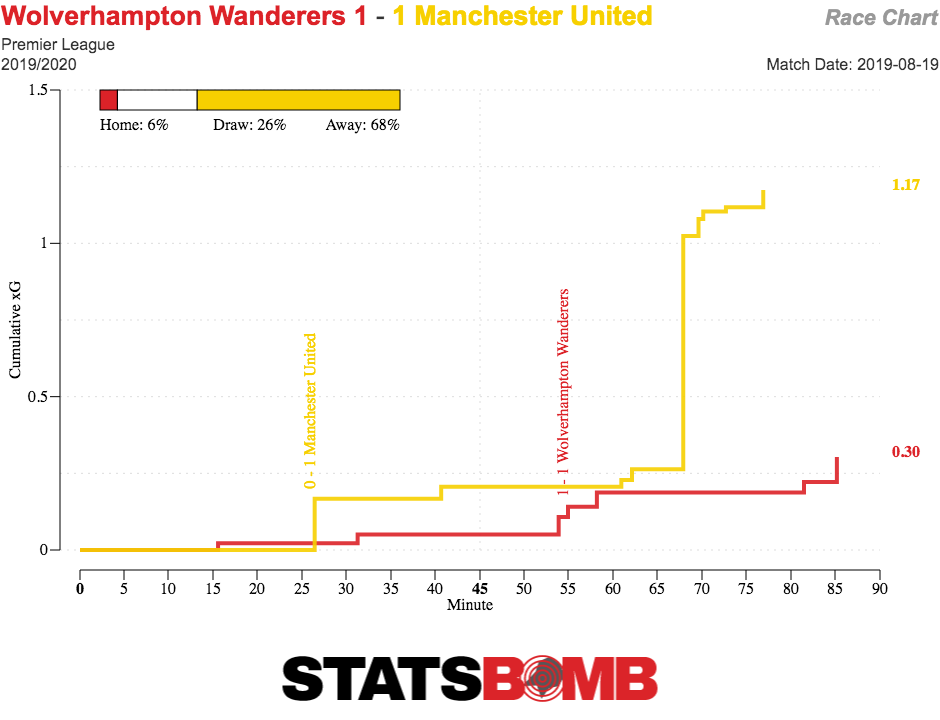 In his Premier League career so far, Ruben Neves has taken 67 shots that were not penalties or direct free kicks. All were from outside the box. Exactly one of them went in the goal, and it came in this match. It’s hard not to chalk that up to a case of shit happens. Solskjaer’s side shut down Wolves’ counter attacks, but seemed pretty toothless in creating chances themselves. The very mobile front four of Daniel James, Jesse Lingard, Marcus Rashford and Anthony Martial didn’t seem to have any way of breaking down a deep defence, and registered just 8 shots outside of the now infamous missed penalty, and 0.41 expected goals. The passmap sums up United’s issues: lots of dominance and interplay with the back four and midfielders, but a struggle to get the attackers involved in dangerous areas.
In his Premier League career so far, Ruben Neves has taken 67 shots that were not penalties or direct free kicks. All were from outside the box. Exactly one of them went in the goal, and it came in this match. It’s hard not to chalk that up to a case of shit happens. Solskjaer’s side shut down Wolves’ counter attacks, but seemed pretty toothless in creating chances themselves. The very mobile front four of Daniel James, Jesse Lingard, Marcus Rashford and Anthony Martial didn’t seem to have any way of breaking down a deep defence, and registered just 8 shots outside of the now infamous missed penalty, and 0.41 expected goals. The passmap sums up United’s issues: lots of dominance and interplay with the back four and midfielders, but a struggle to get the attackers involved in dangerous areas. 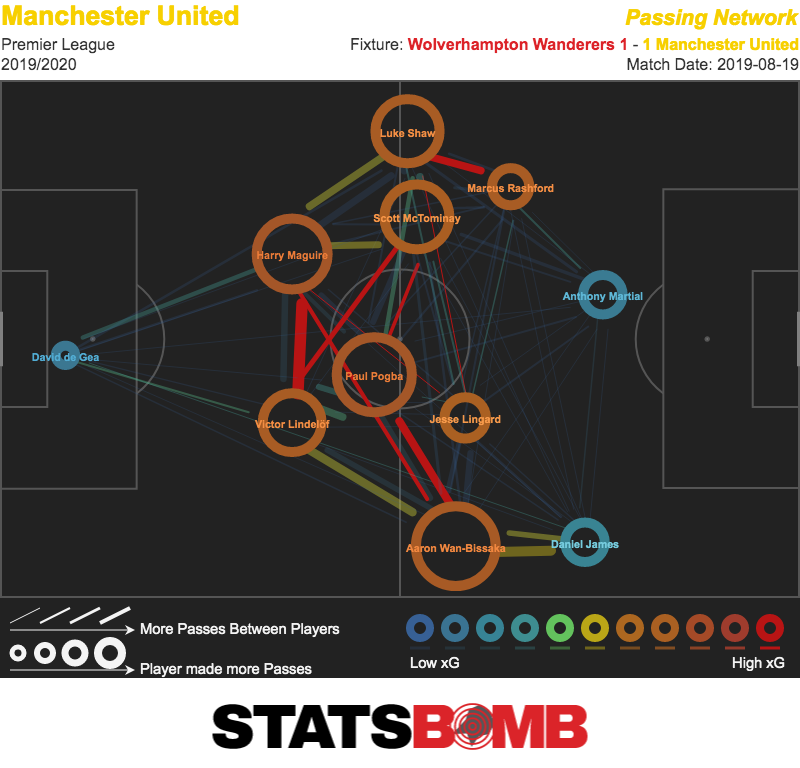 Crystal Palace also defended deep in the following game at Old Trafford, but United had at least a better go at breaking them down. They put up plenty of shots both before and after Jordan Ayew scored the game’s first goal. But, just as Roy Hodgson likely planned it, Palace’s deep block ensured that the chances were of poor quality, mostly being headers or shots with plenty of bodies in the way. Again, if United score the penalty they probably win the game, but you have to squint a bit to argue this was a good attacking performance. At the other end, Palace scored two goals from five shots and 0.89 xG, which doesn’t feel like too much of a serious concern for Solskjaer.
Crystal Palace also defended deep in the following game at Old Trafford, but United had at least a better go at breaking them down. They put up plenty of shots both before and after Jordan Ayew scored the game’s first goal. But, just as Roy Hodgson likely planned it, Palace’s deep block ensured that the chances were of poor quality, mostly being headers or shots with plenty of bodies in the way. Again, if United score the penalty they probably win the game, but you have to squint a bit to argue this was a good attacking performance. At the other end, Palace scored two goals from five shots and 0.89 xG, which doesn’t feel like too much of a serious concern for Solskjaer. 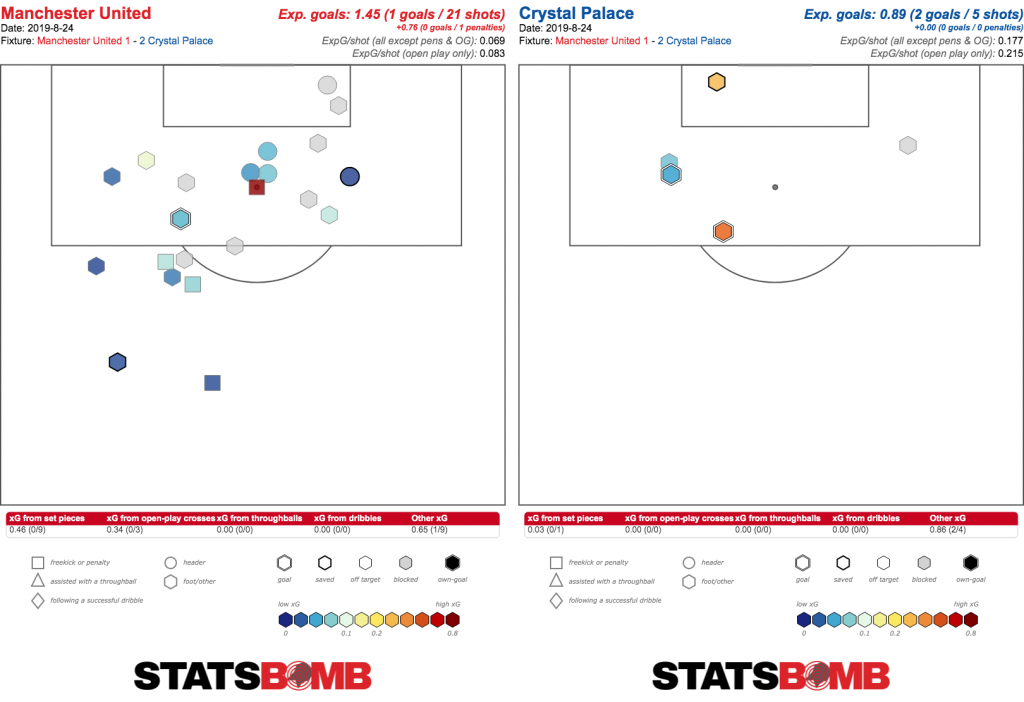 Southampton away was another fixture where United “deserved” to win on xG, but there were still real concerns to be had.
Southampton away was another fixture where United “deserved” to win on xG, but there were still real concerns to be had. 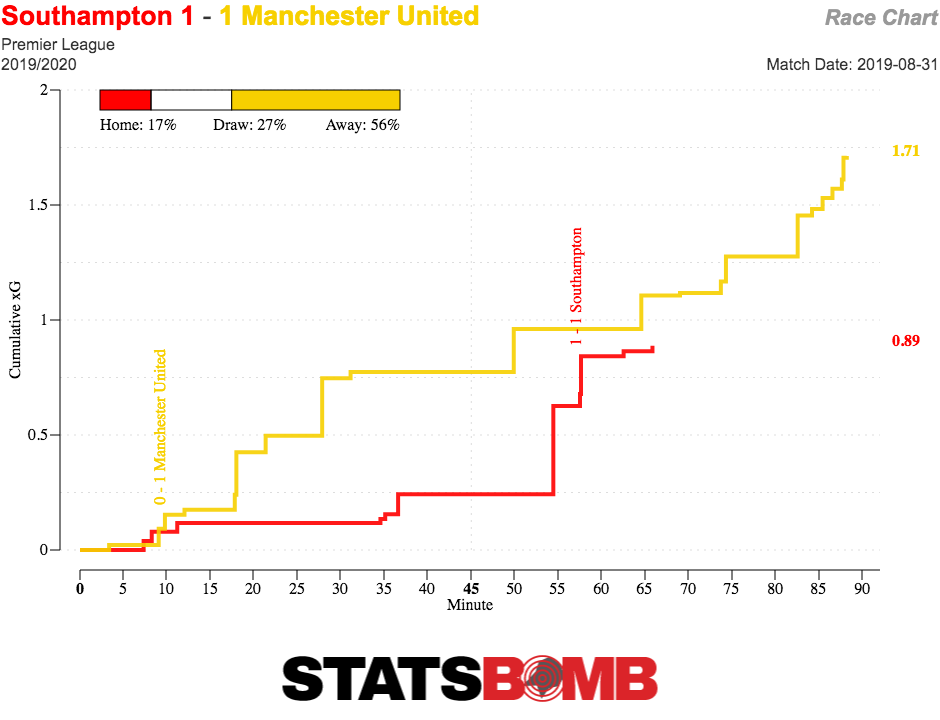 They again recorded plenty of shots, and again struggled in terms of the quality of those chances. Southampton defend in a slightly different way to Wolves and Palace, but the effect was the same. This was a better attacking performance than in those games, but also one in which they were facing ten men for the closing stages. If United can’t create high xG shots then, when will they?
They again recorded plenty of shots, and again struggled in terms of the quality of those chances. Southampton defend in a slightly different way to Wolves and Palace, but the effect was the same. This was a better attacking performance than in those games, but also one in which they were facing ten men for the closing stages. If United can’t create high xG shots then, when will they? 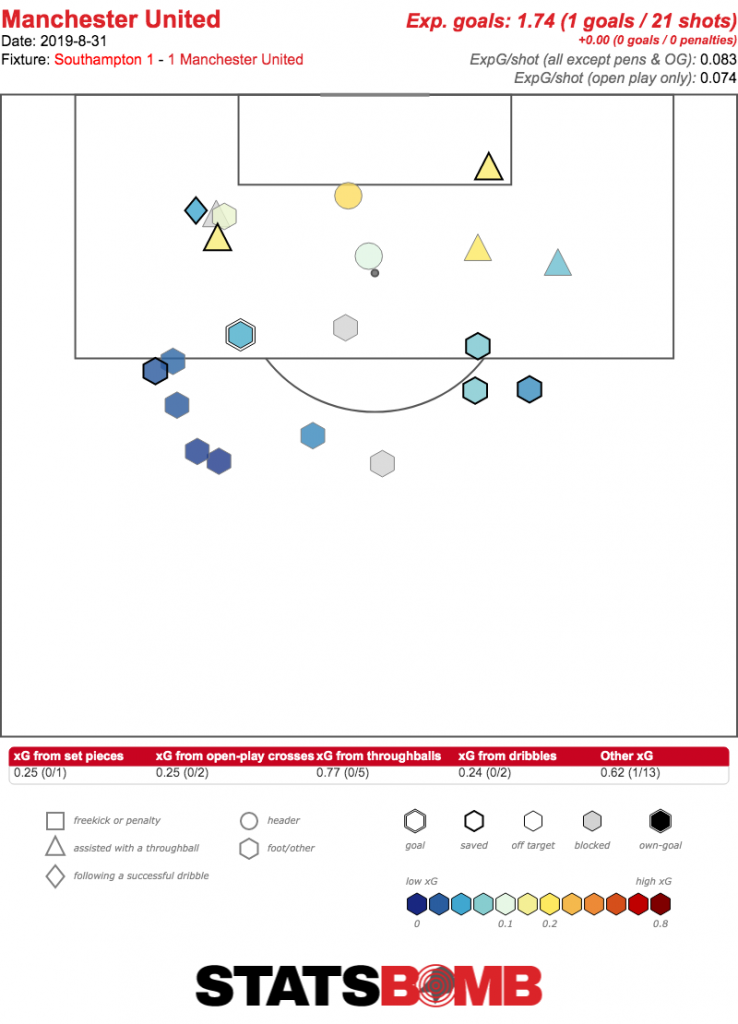
The Bigger Picture
Expected goals says that Man United have been excellent at preventing the opposition from creating chances. At the other end, there’s an unusually large difference in whether the model includes penalties or not. It’s unusual to miss two of three penalties, but it’s also unusual to win three penalties in four games. Otherwise, xG says that United have been fairly middling at creating good chances so far. That the defence has been legitimately excellent does come as something of a surprise. And it’s not just xG that says so. Solskjaer’s team are restricting opposing sides to just three passes in United’s box, the second fewest in the league. Teams have found it very difficult simply to work the ball into dangerous areas. 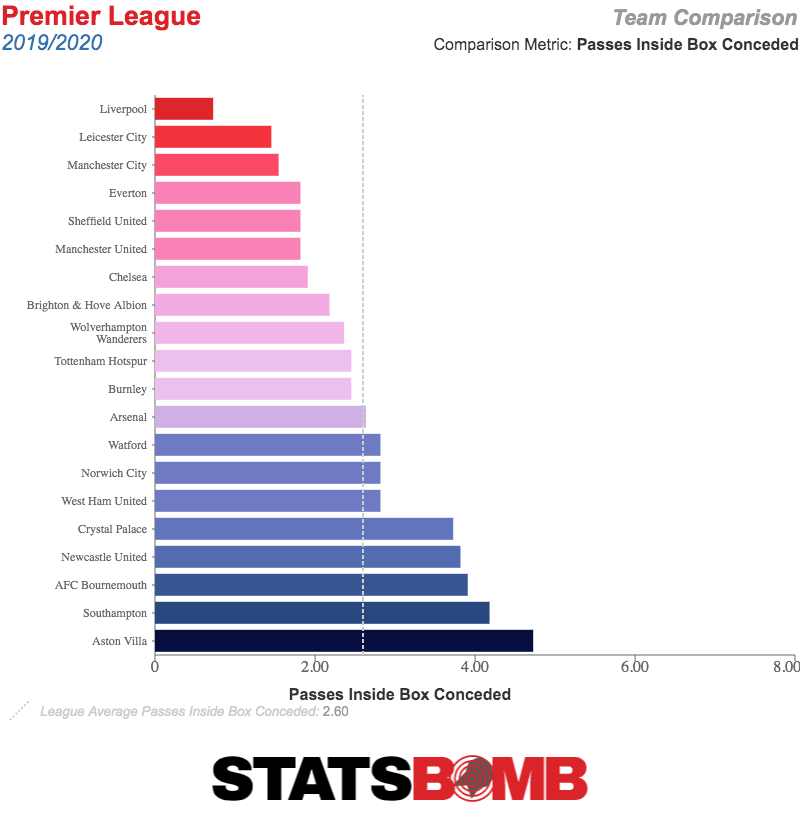 Should this be a surprise? The club did, after all, spend huge sums on Harry Maguire and Aaron Wan-Bissaka to upgrade the back line. If these players are worth the money, they presumably should be having a noticeable effect on United’s defensive numbers. Judging centre backs statistically is an extremely difficult thing to do, so we’re not going to even attempt that here. What we can say is that he’s been unsurprisingly dominant with his head, amassing the most aerial wins of any player in the so called top six so far this season. It looks good, but again, don’t read too much into numbers for a centre back.
Should this be a surprise? The club did, after all, spend huge sums on Harry Maguire and Aaron Wan-Bissaka to upgrade the back line. If these players are worth the money, they presumably should be having a noticeable effect on United’s defensive numbers. Judging centre backs statistically is an extremely difficult thing to do, so we’re not going to even attempt that here. What we can say is that he’s been unsurprisingly dominant with his head, amassing the most aerial wins of any player in the so called top six so far this season. It looks good, but again, don’t read too much into numbers for a centre back. 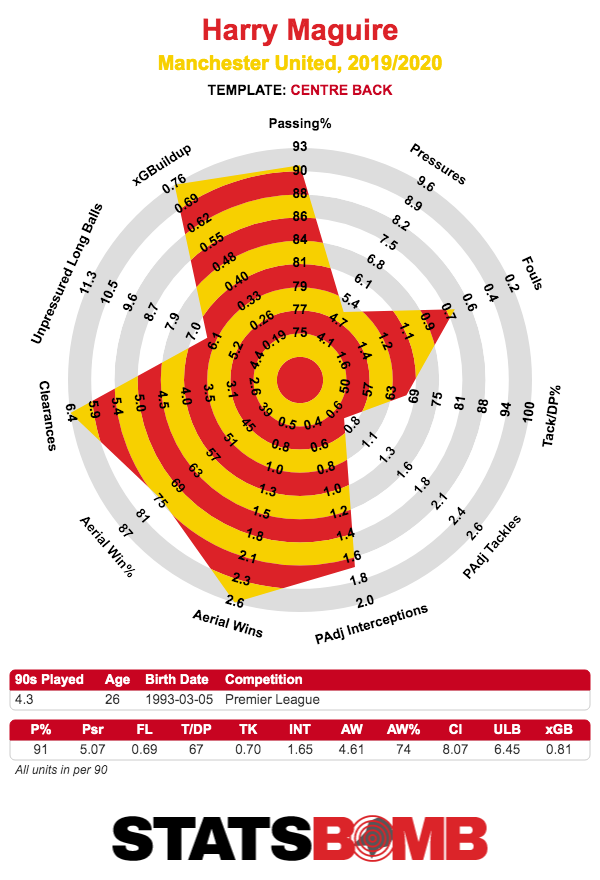 As for Wan-Bissaka, he’s won plaudits for his volume of tackles so far, but that’s not the real story. Defending is not about what you do, but what you stop your opponent from doing. Palace fans had a delightful song about Wan-Bissaka to the tune of “Rock the Casbah” with the line “your wingers don’t like him”, and that sums up what his game is about perfectly. At his best, he doesn’t let players he’s directly up against get past him. Can we find evidence for this in the numbers? Well here’s what there is. When looking at failed attempts to dribble or carry the ball against United this season when under pressure, there’s a pattern. Teams seem to be getting stopped particularly frequently down Wan-Bissaka’s side. Of course, Wan-Bissaka now finds himself injured, so it’s possible that teams will begin to find more joy down this flank.
As for Wan-Bissaka, he’s won plaudits for his volume of tackles so far, but that’s not the real story. Defending is not about what you do, but what you stop your opponent from doing. Palace fans had a delightful song about Wan-Bissaka to the tune of “Rock the Casbah” with the line “your wingers don’t like him”, and that sums up what his game is about perfectly. At his best, he doesn’t let players he’s directly up against get past him. Can we find evidence for this in the numbers? Well here’s what there is. When looking at failed attempts to dribble or carry the ball against United this season when under pressure, there’s a pattern. Teams seem to be getting stopped particularly frequently down Wan-Bissaka’s side. Of course, Wan-Bissaka now finds himself injured, so it’s possible that teams will begin to find more joy down this flank. 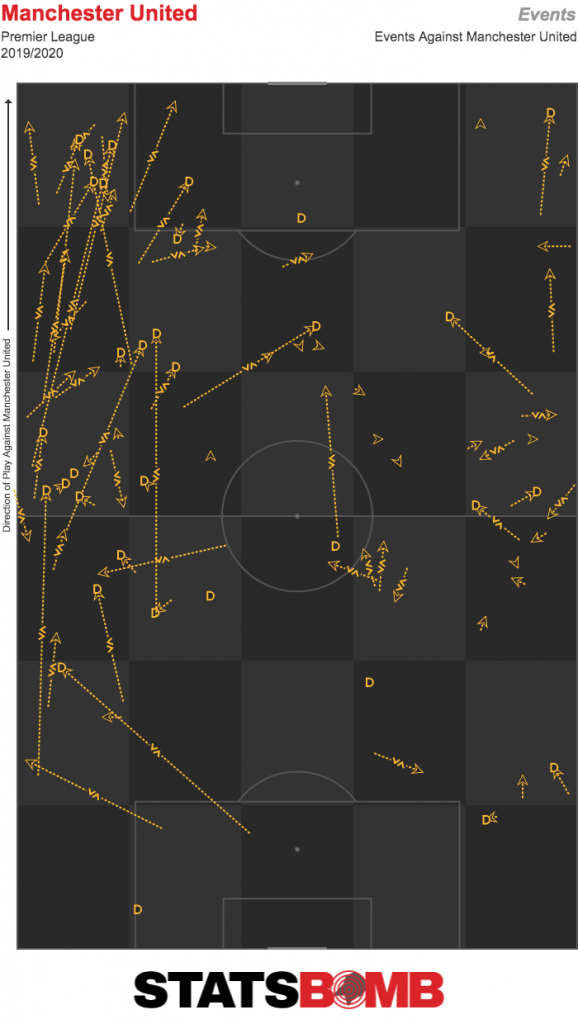 In front of that back four is where it was thought that United would be flimsy, but not so far. Scott McTominay as the side’s primary ball winning midfielder seemed like a strange idea since he’d previously shown little aptitude for winning the ball. Now, it remains very early, and we’re talking about 10 tackles and 6 interceptions here, hardly a sample size worthy of huge extrapolation. But this is a promising start for him in a new role, as he’ll certainly need to keep it up if United are to hold this midfield together.
In front of that back four is where it was thought that United would be flimsy, but not so far. Scott McTominay as the side’s primary ball winning midfielder seemed like a strange idea since he’d previously shown little aptitude for winning the ball. Now, it remains very early, and we’re talking about 10 tackles and 6 interceptions here, hardly a sample size worthy of huge extrapolation. But this is a promising start for him in a new role, as he’ll certainly need to keep it up if United are to hold this midfield together. 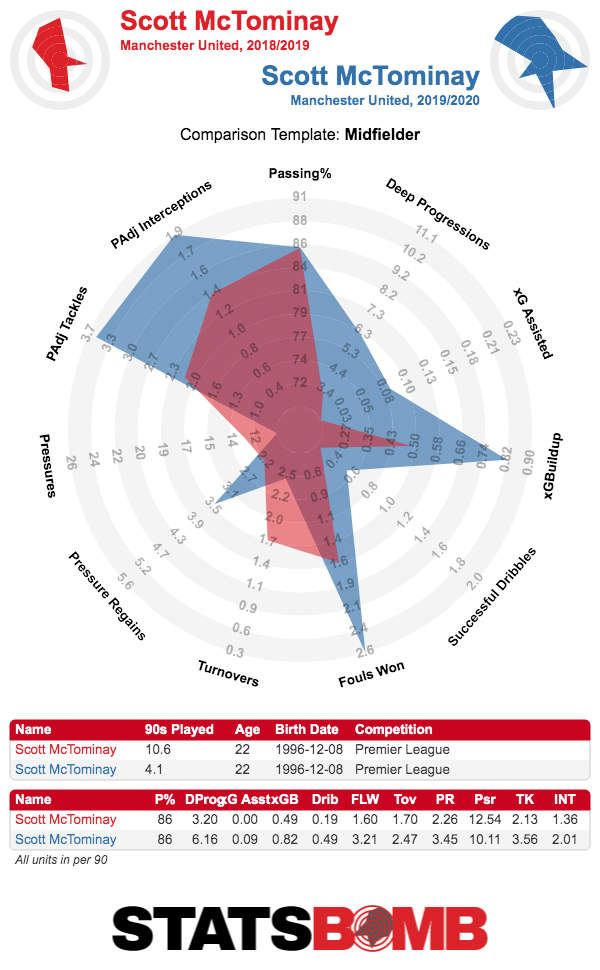 The obvious area with less positive news, though, is in goal. When people put out their Premier League teams of the decade this December, it seems very likely that most will feature De Gea between the posts. There have been times when the Spaniard has seemed to single-handedly keep United afloat while everything around him was collapsing. But from the 2018 World Cup onwards, De Gea has seemed positively mortal. In the time since Solskjaer took the reins at Old Trafford, StatsBomb’s shot stopping model has had De Gea as almost exactly league average, after having previous periods of astonishing numbers. The early stages of this season have been notably worse than that, with De Gea already estimated to have cost United a goal more than the average ‘keeper. My instincts throughout this disappointing period have been to back the player who previously looked so good to turn it around, to expect that he’ll shake it off sooner rather than later. But these issues have been going on long enough that clearly something is up with him. Expected goals is an invaluable metric in understanding football and its increasing media prominence is undoubtedly a positive. In past years, United’s results would have told the whole story and everyone would have agreed that the club was in crisis. We can now see that the scorelines do not tell the whole story and there are positives to take from the four games so far, with the team having avoided conceding much in the way of real chances. But it’s important to understand what the numbers do and do not tell us. This team has not been attacking especially well, and three penalties clouds things somewhat. Perhaps if opposing players did not foul United in the box, those three moments would have led to some excellent opportunities that would boost the attacking xG. We will never know. What we also have to note is that this is just four games, and the approaches of the opposition sides has had a significant impact on these numbers. With the exception of the first half against Chelsea, United have not been facing opponents continually trying to force the issue and really push this team. The pattern of play for the most part has been of teams soaking up pressure and looking to counter. That they have struggled to counter effectively is something United should get credit for, yes, but we will have to wait and see if this defence holds up to being tested in other ways. On the attacking side, there are real questions to be answered. United have played better football than the results would suggest, yes. But that does not mean that there are not concerns, or that the performances will continue to look so positive in terms of xG. Header image courtesy of the Press Association
The obvious area with less positive news, though, is in goal. When people put out their Premier League teams of the decade this December, it seems very likely that most will feature De Gea between the posts. There have been times when the Spaniard has seemed to single-handedly keep United afloat while everything around him was collapsing. But from the 2018 World Cup onwards, De Gea has seemed positively mortal. In the time since Solskjaer took the reins at Old Trafford, StatsBomb’s shot stopping model has had De Gea as almost exactly league average, after having previous periods of astonishing numbers. The early stages of this season have been notably worse than that, with De Gea already estimated to have cost United a goal more than the average ‘keeper. My instincts throughout this disappointing period have been to back the player who previously looked so good to turn it around, to expect that he’ll shake it off sooner rather than later. But these issues have been going on long enough that clearly something is up with him. Expected goals is an invaluable metric in understanding football and its increasing media prominence is undoubtedly a positive. In past years, United’s results would have told the whole story and everyone would have agreed that the club was in crisis. We can now see that the scorelines do not tell the whole story and there are positives to take from the four games so far, with the team having avoided conceding much in the way of real chances. But it’s important to understand what the numbers do and do not tell us. This team has not been attacking especially well, and three penalties clouds things somewhat. Perhaps if opposing players did not foul United in the box, those three moments would have led to some excellent opportunities that would boost the attacking xG. We will never know. What we also have to note is that this is just four games, and the approaches of the opposition sides has had a significant impact on these numbers. With the exception of the first half against Chelsea, United have not been facing opponents continually trying to force the issue and really push this team. The pattern of play for the most part has been of teams soaking up pressure and looking to counter. That they have struggled to counter effectively is something United should get credit for, yes, but we will have to wait and see if this defence holds up to being tested in other ways. On the attacking side, there are real questions to be answered. United have played better football than the results would suggest, yes. But that does not mean that there are not concerns, or that the performances will continue to look so positive in terms of xG. Header image courtesy of the Press Association
